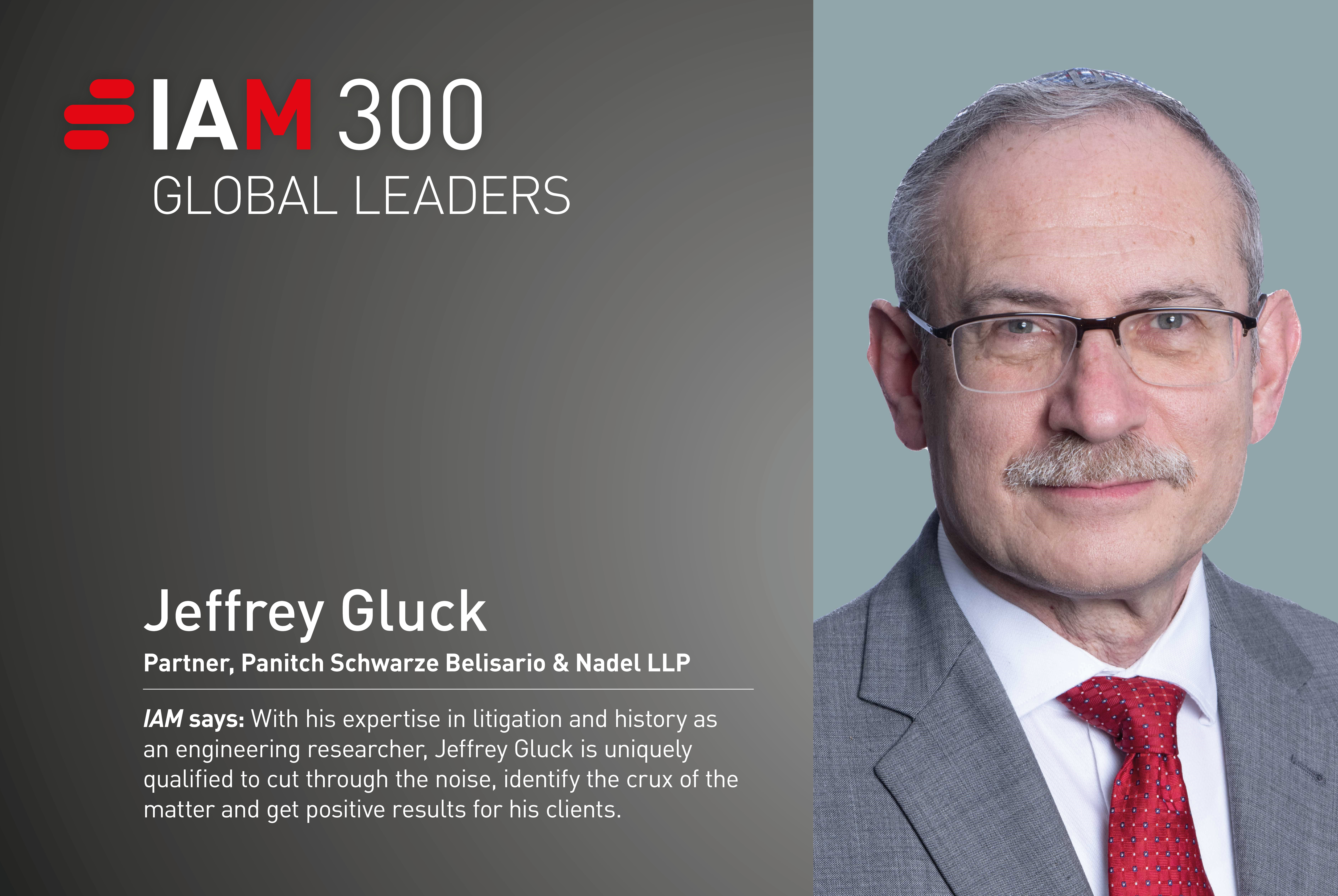Jeffrey W Gluck
Having had fruitful careers as an engineer and researcher, what inspired your shift into IP law and what advice would you give to someone else considering doing the same?
My career has taken many twists and turns. I fell into intellectual property when I was laid off as a director of research and became a patent examiner. During this time, the USPTO provided copies of the United States Patents Quarterly and in reading this regularly I developed an interest in patent law. I was then recruited by a law firm and sent to law school where I studied other types of IP law. This broadened my interest and led me to a varied practice where I counselled clients on all aspects of IP law. I advise engineers and scientists to investigate IP law, decide if it is appealing and, if so, to seek out IP practitioners to learn about careers in IP law.
You are a member of several associations, such as the Institute of Electrical and Electronics Engineers (IEEE), the American IP Law Association and the International Association for the Protection of Intellectual Property. What valuable lessons have you learned from being a part of these?
Professional associations are invaluable for developing relationships and having meaningful discussions about matters of professional interest. IEEE was a community in which I could learn about research being carried out by others, and vice versa, and it now helps me to remain current about technology trends. Legal associations have given me the opportunity to develop professional relationships, to learn about recent trends in the law and to present my own views on those trends. They provide the opportunity to see and appreciate different perspectives.
If you could change three things about prosecuting patents before the USPTO, what would they be, and do you think they are likely to happen?
First, treatment of software-related inventions and algorithms. There is inconsistency among examiners and supervisors on what constitutes patent-eligible subject matter. As long as neither Congress nor the courts clarify the law of patent-eligibility, uncertainty will remain, but it is possible that one of these bodies may take action.
Second, restriction and election practice. This is optional yet many examiners do not seem to understand this. Some make election of species requirements based on the drawings without sufficiently studying the claims to see how they do (or do not) correspond to the respective drawing figures. This issue could be addressed, but it is unclear whether the USPTO is examining it.
Third, educational level and technical understanding of examiners. This is beyond the control of the USPTO most of the time and it depends on the engineering and science job markets; it is difficult and costly to provide sufficient technical training to examiners who are not initially trained or experienced.
As more and more industries are affected by technological convergence, what considerations should patent owners bear in mind when assessing their existing IP strategies?
They should evaluate the patents that they hold to determine whether these cover developing technologies, as new uses may develop for existing, patented technologies. For patent applicants, the strategy is to try to anticipate developing technologies that might use their inventions. They can do this by broadly disclosing and claiming the subject matter so that resulting patents may be applicable to these developing technologies, in addition to targeting the intended use.
What do you think the most pressing challenges will be in the coming months and years in the IP strategy space, and what are you doing to prepare clients for these?
One challenge is to resolve IP issues relating to generative AI. It is tempting to use generative AI, such as ChatGPT, to create new works of authorship and ideas. There are major copyright questions that have not yet been resolved (eg, regarding use of copyrighted training data and the IP status of the output). I warn my clients to be extremely wary of using generative AI as a professional tool for generating new works of authorship, software or new technologies.
Another challenge is the resolution of patent-eligibility questions pertaining to software-related inventions, diagnostic methods, and other fields in which questions exist. Case law continues to evolve, but it may require action from Congress to resolve some of these issues. I advise my clients to consider the present state of the law and to look at their ideas from a patent-eligibility standpoint, for purposes of disclosing and claiming them in patent applications.
Jeffrey W Gluck
Partner
[email protected]
Jeffrey Gluck is an IP attorney and partner with Panitch Schwarze Belisario & Nadel LLP. Dr Gluck’s practice includes patent procurement, client counselling and opinion work, litigation and software-related copyright law. He specialises in the electrical and computer-related arts, while also maintaining a broader practice. He serves on AIPLA and IPO committees and is a US delegate to AIPPI Standing Committee Q222 – Standards and Patents.
